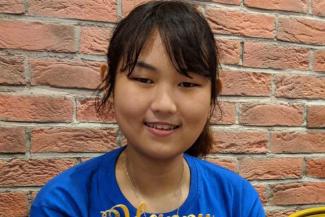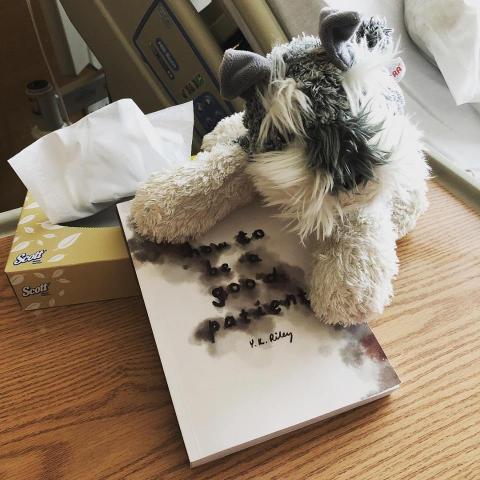
Living with three autoimmune conditions, followed by a liver transplant at 18, has not deterred this 18 year old teenager from Singapore who has written a book under the pen name Y.K Riley. She highlights the challenge of living with an invisible illness, the side effects of her treatment and the need to understand her conditions.
Please tell us a bit about your condition(s)
I have Autoimmune Hepatitis, Primary Sclerosing Cholangitis and Ulcerative Colitis. They are autoimmune diseases where my immune system attacks my liver, bile ducts and colon respectively. I was also recently diagnosed with Osteoporosis.
What were the early symptoms and what led to a diagnosis? What in your view got you a comprehensive diagnosis quickly?
I had jaundice where my eye whites started to yellow, I had a lot of pains in my stomach, I felt more tired, had a lot of itchiness and had diarrhoea and bloody or pale stools. I was diagnosed at KKH after they did a liver biopsy, MRI, Ultrasound and colonoscopy. I think I was really lucky to have been diagnosed quickly to maintain the diseases with medication.
As for osteoporosis, it started out as a hairline fracture in my spine that I had gotten somehow. I never had a fall or did anything that could have caused that. A bone density test showed that my bones were in the osteoporosis stage and my fracture was diagnosed by an MRI as it was too small to be found in the x-ray.
Is there a history of any of the 3 conditions in your family?
No. There isn’t anything even remotely related to autoimmune conditions.
What is your present condition?
Post Liver Transplant, with inactive Ulcerative Colitis. Unknown if PSC and AIH will recur but I’ve been given medications to maintain my current condition. I also have an artery stent in my liver because it collapsed after my transplant.
What medications are you on?
Tacrolimus, Prednisolone, Mycophenolete, Clopidegral, Rabeprazole, Valgonciclovir, Calcium and Vit D, Magnesium & On-Off Omiprazole.
Stress is often a trigger for auto-immune conditions. Did you observe the co-relation?
Stress can aggravate the condition, but is not a direct cause of it. I feel that I have more symptoms when I am stressed from an upcoming examination.
What were the most challenging symptoms of the condition as well as the side effects of medicine that you had to deal with – especially during High School?
Fatigue made it hard to study and remember some things. Jaundice made me a bit self conscious especially when it worsened over the years. Itchiness made it hard to sleep at night so I was tired every day. Medicine made me have moon face, bloating and swelling and severe weight gain which caused stretch marks. Diarrhoea was uncomfortable to have and I would miss school on those days. I also fell sick with cough and colds more often due to my compromised immune system, and would take much longer to recover than my peers. My longest was 3 weeks to a month, with sore throat and runny nose. My liver can hurt really badly but it happens really rarely so I’m not too bothered. My periods were messed up by the medications as well, I started my meds the same time that my periods started. As a result my periods now can come twice a month, skip one or two months, have no fixed day to start, last at least 7 days, start & end with either heavy or light flow, and basically have no way of predicting. Once, it wouldn’t stop for 3 weeks until I took birth control pills from the gynae. If it’s a heavy flow I am unable to do anything for the first 3 days other than changing heavy night pads every hour.
Did your condition affect your social interaction with friends?
It did somewhat. I couldn’t talk to my friends about my medical issue and I didn’t get some of the topics they discussed as well. We had common interests but it was hard to keep up since I usually zoned out during conversations since I was always tired and felt detached from the environment.
Have you had to make some changes to your lifestyle because of your condition?
Yes. I avoided running because it gave me stomach pains. I also couldn’t do any contact sports. My stamina was much lower than others. I couldn’t climb 2 flights of stairs without feeling out of breath so getting to classes was a slow process. I had to bring my medicine to school and it was awkward eating them in class. I developed a bit of an obsession with washing my hands with soap because I hate germs, so whenever I touched something in public, once I’m home or near a restroom I would wash my hands with soap. I couldn’t eat without washing my hands beforehand as well. Then I would wash my hands after. I also brought wet tissue everywhere so I could clean my hands before eating.
What was the hardest part of the treatment ? what kept you going? How has this changed your life perspectives and ambitions.. Any inflection points (which changed your approach to managing your condition or to life) you would like to talk about.
The hardest part is knowing that the conditions are unpredictable. I never know when a flare will come, when it will be a bad day or when my blood results are bad and I’ll be sent back to the hospital. I’m also still struggling with the weight I gained from prednisolone since I’m scared running or other exercises will cause another bout of stomach pain. I think what keeps me going is knowing I still have a future no matter what. My life will be what I can make of it so even if I have these conditions, I should do the best that I can even if I fail. If my body can’t be trusted than I will just have to work a way around that with what I am able to do. I don’t know when I realised this, I just started to shift to this mindset over the years.
You have written a book on “How To Be A Good Patient”. What made you pen a book? Tell us what makes you a good and empowered patient?
I just wanted to raise awareness on invisible illness. I realised that many people don’t see how we can suffer on the inside while looking perfectly fine on the outside. MakeAWish suggested I write a book to let people know about my experiences as a way to raise awareness.
Click here to order the book
I think that what makes a good and empowered patient is one who will do their research on their own disease, and are able to discuss with their doctor about blood results, tests, procedures & other things related to their condition. Knowledge would be one thing that helps me feel more in control of my disease, so I like to have discussions with my doctor and often bring up questions he is surprised to hear. For example, I’ve asked “If my immune system is constantly attacking my liver, does that mean it is stronger than the usual immune systems so that I am more able to fight colds and other viruses?” The answer was no but my doctor was shocked because no one had asked him such a question before. Another time, when I was warded because of CMV infection, they gave me a drip that made me weak and uncomfortable, and I couldn’t sleep for 3 days because I kept getting up to vomit or dry heave. I discussed with the doctor on the 4th day the pros and cons of the drip, bringing up how it severely affected my mentality because being sleepless & uncomfortable stressed me out a lot. With the help of my nurses they switched the drip to an oral medicine much lesser side effects.
Have you learnt anything in managing in your condition that you wish you knew before?
I wish I knew how horrible bowel prep tasted before I had to do my first colonoscopy. And how much biopsies hurt. I also wish I knew I could use my phone during ultrasounds because I had countless ultrasounds over the years and they had been painful, boring and long.
What kind of specialists do you consult and how often?
It used to be just the gastroenterologist monthly & occasionally gynaecologist for my periods. Now it’s my gastroenterologist monthly, dietician bi-monthly and orthopedist a few times a year.
Have you tried complementary medicine or therapies, like TCM or yoga?
I’ve only tried going vegan which didn’t work out. I don’t take other medicine or tcm as they could affect my medication. I did yoga for half a year at my first Polytechnic.
Has it been difficult emotionally to cope with your condition? How has your family supported you?
It hasn’t been too bad, I would say. When I’m down, reaching up on my condition and about what others have to say about theirs helps me feel a bit better. I also tend to ‘escape’ to anime or books when I don’t feel like facing my own life. Studying helps because it makes me feel smarter and that boosts my self esteem a bit.
My mom has been my closest confidant and best friend. So I would go to her when I needed support and barrage her with questions when I feel insecure about my own decisions. She also tries to visit me in the hospital everyday after work when I am warded. She buys me my favourite foods and desserts so that I’m not so lonely.
My dad is usually busy so I don’t talk to him much but he does accompany me to blood tests or appointments sometimes and he buys me food a lot. He also brings home lunch when I was on deferment so I wouldn’t have to go out to buy it myself.
I’m not on good terms with my brother so I tend to avoid him, but I had a miniature schnauzer, Fluffy, who had been a Sister to me for years before she passed away. She was the one I went to for cuddles and to rant at, and just to accompany me in my room while I did my own things. I used to take care of her properly before my diagnosis but after that my parents were the ones walking her instead so I still feel bad about that. I’m holding on to the memories of cycling with her in my basket and going to the playground together when we were younger.
We’ve adopted our second dog, Riley, whom I hope I can take better care of after I recover from my transplant.
Are there moments of humour that you would like to share
One time, I was preparing for school in the morning while my mom left my breakfast on the table. She made sausages and an egg. When I came out to have my breakfast, my plate was empty & Fluffy was sitting beside my chair looking at me innocently.
After my transplant, I couldn’t stay with Riley so I lived at my grandma’s place instead. My parents sent me a photo of what Riley did - She ate part of the sofa. The outer covering on one side was torn to shreds, and the inside had some stuffing missing.
Any message for other patients with similar/autoimmune conditions
Try to research about your condition. It feels better knowing what’s happening to your own body. And remember that while you can’t do everything, there are some things you still can do so focus on those instead.







